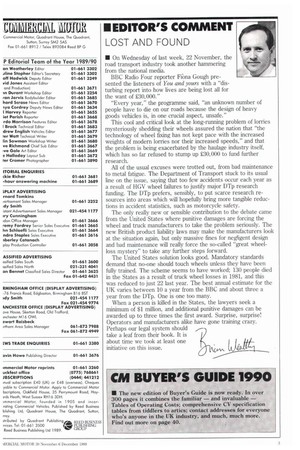MED1TOWS COMMENT
Page 5

If you've noticed an error in this article please click here to report it so we can fix it.
LOST AND FOUND
• On Wednesday of last week, 22 November, the road transport industry took another hammering from the national media.
BBC Radio Four reporter Fiona Gough presented the listeners of You and yours with a "disturbing report into how lives are being lost all for the want of 20,000."
"Every year," the programme said, "an unknown number of people have to die on our roads because the design of heavy goods vehicles is, in one crucial aspect, unsafe."
This cool and critical look at the long-running problem of lorries mysteriously shedding their wheels assured the nation that "the technology of wheel fixing has not kept pace with the increased weights of modern lorries nor their increased speeds," and that the problem is being exacerbated by the haulage industry itself, which has so far refused to stump up 00,000 to fund further research.
All of the usual excuses were trotted out, from bad maintenance to metal fatigue. The Department of Transport stuck to its usual line on the issue, saying that too few accidents occur each year as a result of HGV wheel failures to justify major DTp research funding. The DTp prefers, sensibly, to put scarce research resources into areas which will hopefully bring more tangible reductions in accident statistics, such as motorcycle safety.
The only really new or sensible contribution to the debate came from the United States where punitive damages are forcing the wheel and truck manufacturers to take the problem seriously. The new British product liability laws may make the manufacturers look at the situation again, but only massive fines for negligent design and bad maintenance will really force the so-called "great wheelloss mystery" to take any further steps forward.
The United States solution looks good. Mandatory standards demand that no-one should touch wheels unless they have been fully trained. The scheme seems to have worked; 130 people died in the States as a result of truck wheel losses in 1981, and this was reduced to just 22 last year. The best annual estimate for the UK varies between 10 a year from the BBC and about three a year from the Dip. One is one too many.
When a person is killed in the States, the lawyers seek a minimum of $1 million, and additional punitive damages can be awarded up to three times the first award. Surprise, surprise! Operators and manufacturers alike have gone training crazy. Perhaps our legal system should ,.
take a leaf from their book. It is about time we took at least one initiative on this issue.
















































































































